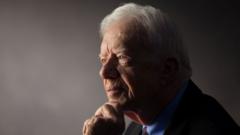Jimmy Carter's lengthy post-presidency life came to a close just as the current global landscape continues to demonstrate a disconcerting familiarity with the crises he faced during his time in office. The past forty-four years have introduced new leaders and shifting dynamics but the core challenges of resilience, economic stability, and foreign relations appear uncannily similar.
Back in the late 1970s, the United States, under Carter, dealt with economic instability, a crisis of confidence among citizens, and a struggle for power on the world stage. On the economic front, rampant inflation and energy shortages showcased the vulnerabilities at home while abroad, the fallout from international conflicts—such as the Iranian hostage crisis—left the nation feeling helpless. These sentiments resonate with modern-day challenges as President Joe Biden encounters inflationary pressures, an unstable economy, and growing tensions in the Middle East and beyond.
Carter's diplomatic initiatives, most notably the Camp David Accords, saw momentary success in facilitating peace between Egypt and Israel. Yet, unresolved issues, such as the enduring Israeli-Palestinian conflict, lingered and continue to erupt today, particularly amidst recent hostilities sparked by Hamas. Moreover, the uncertain political terrain in the Middle East today mirrors the worldwide perception of American influence that waned during Carter's presidency.
Meanwhile, domestic trust in the government remains an ongoing battle, first raised by Carter in his "crisis of confidence" speech. Fast forward to Biden's term in office, public trust remains shaken and often fuels political division. Even as Biden takes on aggressive stances regarding international crises—most visibly through the support of Ukraine against Russia—the same sense of urgency that marked Carter's decision-making processes haunts his presidency.
Carter's approach to environmental issues paralleled Biden's focus on renewable energy and climate agendas. Yet, while Biden's administration has emphasized growth, public frustrations over inflation bid him to walk a fine line between economic recovery and scrutiny. In stark contrast, Carter's post-presidency encompassed compassion and global service, focusing on humanitarian work and the promotion of democratic principles through the Carter Center.
In this enduring narrative of American leadership, the comparisons between Carter's presidency and Biden's reflect an ongoing dialogue about accountability, resilience, and humility amidst the challenging political landscape that shapes the lives of millions. As history continues to unfold, the lessons from Carter's presidency stand as a mirror reflecting society's quest for connection, stability, and purpose in turbulent times.

















